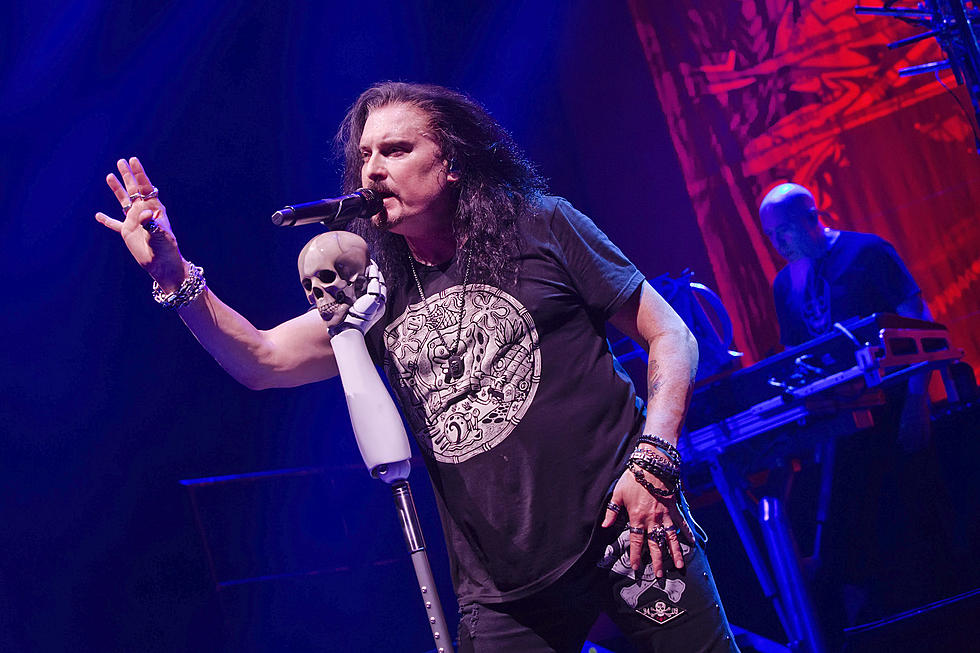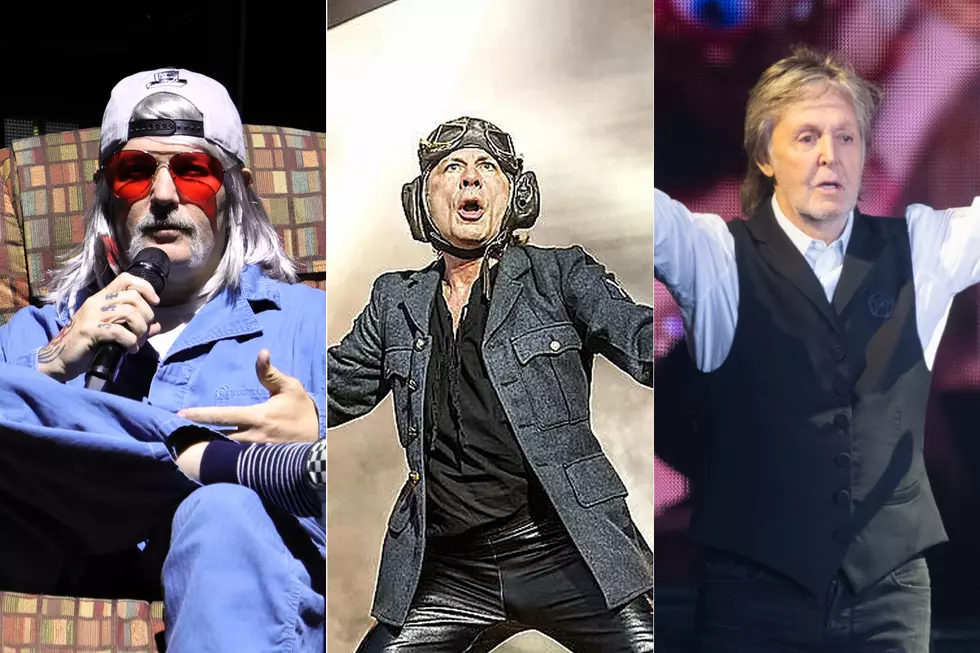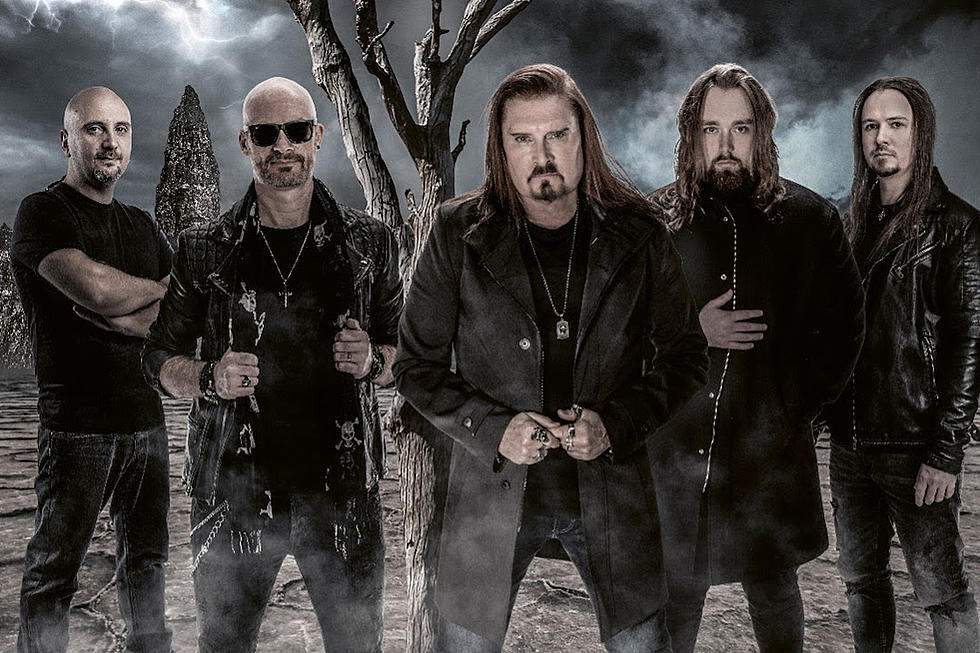
Dream Theater’s James LaBrie: There’s a Level of ‘Genius’ to Making Simpler Music
Dream Theater's James LaBrie was the latest guest on Full Metal Jackie's weekend radio program. The singer discussed how the band intentionally dialed back their more epic tendencies on the new album, Distance Over Time, instead focusing on a heavier record after issuing the conceptual double album The Astonishing.
He also mentioned that while writing music as progressive as Dream Theater does obviously requires a certain level of musical intellect, that's not to say there isn't a level of genius involved in making simpler music.
Read the full conversation below.
The new norm is bands sharing files online and recording their tracks independently. How does recording while actually living together like Dream Theater did lead to better music?
Well, you know, all the bands we grew up listening to Rush, Led Zeppelin, Pink Floyd, Deep Purple etc., for those bands, that was the only way you did a record; you were in the same room, you were vibing off of each other's energy. There's a lot to be said for that. It's not that the technological age makes it any less — the human element is definitely disconnected there, but I think, at the end of the day, you can still get tremendous music from that.
But with us, we wanted to focus on Dream Theater getting in the same room and it was great. We haven't done that. Well, we did that, to a certain degree, with every other album, with the exception of The Astonishing. It's kinda great to get back in there. You have five guys. We all come in with some ideas or seeds, and it seems to go quite prolifically. At that point, things move ahead quite fast.
For instance, we counted out the days of actual writing and it was 17 days to put the album together. Now, beyond that, it's refining everything: the arrangements, obviously, coming up with the melodies, vocal melodies and every other little sprinkling of sugar that kinda brings the album to its conclusion.
We had a blast doing it. We were living together and doing barbecues and cooking food. I mean, most of the time, we were ordering in food, even though we put out videos where we're in the backyard and having a big smoke-out, like chicken or whatever it might be. But for the most part, we were ordering in because it would have been too much of a disruption. But it was great and I think that the album proves that synergy that was felt by all. It really helped produce the kind of album that we have here.
Compare to much of the Dream Theater catalog, Distance Over Time is much more concise. What's the band's strength when it comes to being more succinct?
We always start to discuss the kind of album that we feel we all wanna go towards or go in that direction. Before we knew it was going to be Distance Over Time, we started talking when we were winding down the last tour. It's usually a few months before we're done, even six months before we're done with a tour, that we start going, "Okay, guys. We're going to take a break here and see you guys in six to eight months," or whatever. "But, in the meantime, why don't we start thinking about the kind of album that we feel is necessary, or that we feel that we're being motivated or influenced to go in that direction."
And so, with this album, we knew we wanted to make a heavy album. We also knew that we didn't want to get caught up in writing epic tracks, which is really easy for us to do. We said, "We can always come back to that, but let's make this album much more organic-sounding and much more concise." And so, that was always at the top of the list.
We'd find ourselves going off on a little bit of meandering or tangent, here or there, musically, and then we'd pull the reins in. Actually, Mike Mangini was pretty funny. He'd keep standing up, "Come on, guys. Guys. Guys. We're going a little crazy. Here we go. We're going off on that train." And we'd go, "Yeah. Okay," so we'd pull it back.
I think, to some extent, it's easier for us to write and just go off and write an epic track, than it is to say, "No, no. no. Hey, we got this. We got this section, this section, this section, but let's wrap it up." I've always said, as much as you might think simple music, on the surface, is, "That's so easy to write" or it's very formulated, actually, the genius is in making it something that resonates, something that really sticks and something that is brilliant. U2 have done that wonderfully throughout the years.
Distance Over Time is a heavy album. What do you enjoy most about singing heavier material?
There's an energy around heavy music. It's almost primal. I'll speak for myself, I mean, I connect with it immediately and with the other guys, I think it's the same, whether we were listening to Metallica or Iron Maiden — Led Zeppelin have always been my favorite. I think they were the true metal gods of their time, even though it was blues influenced in that but it just had this heavy overtones always going on.
The whole backbone of their music was just incredible and it was heavy. With that being said, right now I'll listen to bands like In Flames and I think they're an amazing band and a great Swedish metal band.
So just to be able to do an album like this again, I mean we haven't done an album this heavy since Train of Thought and that was 2003. It was kind of great to get back to that, to just let it get out there. It's predominantly being lead by guitars.
If you don't have the heavy guitars, you're just going to miss your mark horribly, [laughing] so that's first and foremost and everything else has to blend in and marry up to it. I just think it's always been a part of who and what Dream Theater is and has been. We've always been referred to as a progressive metal band, so it's kind of natural for us to go in this direction and to take it full-on as we did with Distance Over Time.
Musically, Dream Theater can be pretty complex. What challenges you most as a vocalist singing within such complicated instrumentation?
I wouldn't say that I'm necessarily challenged by its complexities or the technical aspects or the discombobulated time signatures [laughing], but I would say it's just to be able to keep it kind of focused when the voice comes in to really be able to connect with the listener even though what's going on musically might be very technical or might be complicated its the voice that cements it. For me, it's the ultimate position to be in as a vocalist because of the template that we are working with and the fact that we can be very diverse in our music.
The fact that we go anywhere we want, we're not constricted in that sense that, "Oh this is your sound don't go off or you're gonna lose your fans." Our fans have come to expect the unpredictable from a band such as Dream Theater. I have this unlimited vehicle to sing through or with when it comes to Dream Theater, so I've been able to express myself in every which way as a vocalist. It's the ultimate situation to be in. I absolutely love it.
I mean I grew up listening to Rush from sun up to sun down and they are my favorite band as far as that kind of music goes, so to have found when I did hook up with Dream Theater, it was a dream come true, no pun intended.
James, on tour you're commemorating the anniversary of Scenes From a Memory. How are you approaching the presentation of that story differently now compared to 20 years ago?
Well the production is much more enhanced with the technology that grew in leaps and bounds it makes it a little bit easier to really convey the whole story behind that; the reincarnation, the love triangle, the deceit and betrayal and mistrust and all that. There's a lot of imagery going on throughout the evening that really supports the lyrical content.
At the same time, the lighting show is phenomenal. We've been working with a friend of mine for 30 years (plus he's from Toronto, Canada where I'm from). Steve Barrett has been our lighting director for the last 25 years.
He's phenomenal - he's just a genius when it comes to creating these scenes and these worlds so when you come to a show and you see this album, Scenes From a Memory, presented in its entirety it's not just the music that's hitting you, it's the visuals and it really...it's like a vortex you're sucked into this world for the next 78 minutes and you're just gone and before you know it.
All the fans that have been there and that we conversed with after the show or before the show that have seen it already, they are just absolutely enthralled by it and enamored by the presentation. It's really cool to kind of give it a spin with technological devices that we have today.
Early in your career with Dream Theater, illness had a long-term effect on your voice. How did being forced to rethink how to use your voice makes you a better singer?
I had a wicked situation with food poisoning and basically in layman's terms It ruptured my vocal chords. I really did have to think about who I was as a singer. Before the rupture I could sing anything anytime anywhere. I had kind of limitless range. So after that I lost a bit of my range and my voice became very fragile. So it took years to get it back to where I felt in a place that felt normal again. It felt that I could push it and trust that it would be there.
Today, I think I'm singing better than I ever have. I went back to studying again which keeps my voice in great shape while I'm on the road. I do several things now, it's not just about understanding the voice a bit more intimately. When I'm on the road, I eat a lot of vegetables and fruit. I don't drink any alcohol, I don't smoke. I work out every day. I eat a lot of foods that are rich with protein and I get a lot of rest, which is essential for any singer.
When I'm warming up before the shows I start about two hours before the show where I'm just doing very light singing and warming done, vocalizing. Then maybe 30 or 40 minutes before the show I start doing some scales and bringing more of my full voice into it so by the time I hit the stage, it's full on and it's ready to go.
I think all these really factor into allowing me to be still 100 percent in the game. Granted, any singer that I've ever spoken with - if you're sick or if you're just tired, you still gotta go up there and give it your best even though you know you're not going to be giving it the 100 percent that you'd like to. There's many adversarial elements that a singer has to deal with. You need to learn how to minimize those at the most.
Thanks to James LaBrie for the interview. Get your copy of Dream Theater's 'Distance Over Time' here and follow the band on Facebook to see tour dates and more. Find out where you can hear Full Metal Jackie’s radio show here.
See Dream Theater in 2019's Best Metal Albums... So Far
More From Noisecreep










